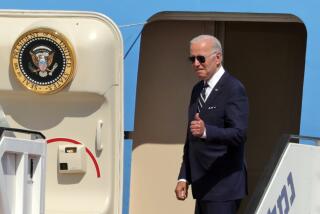Latin Peace Pact Fatally Flawed, President Says : He Assails Accord That Would Let Nicaragua Continue to Receive Soviet, Cuban Assistance
- Share via
WASHINGTON — President Reagan, in an interview made public Saturday, said the Central American peace plan adopted by the region’s five presidents is fatally flawed because it permits Nicaragua to continue accepting assistance from Cuba and the Soviet Union.
Reagan’s assessment was far harsher than his own earlier comments or those of key Administration officials who have praised the objectives of the peace initiative while suggesting that Nicaragua’s leftist government is unlikely to abide by its requirement for democratic reforms.
Reagan said the proposal approved Aug. 7 in Guatemala City contains “loopholes . . . that we’re positive the Sandinistas would take advantage of.” Besides, he said, the plan lacks “safeguards for democracy (in Nicaragua) and our national security.”
Asked in an interview with U.S. News & World Report magazine if the pact had a “fatal flaw” because it allows continued Soviet Bloc aid to Nicaragua, Reagan replied simply, “Yes.”
Aide Wants Plan Changed
Elaborating on the President’s remarks, Elliott Abrams, assistant secretary of state for inter-American affairs, said that the peace plan can be salvaged but only if it is changed to ban Soviet and Cuban aid to Nicaragua.
“The Soviet-Cuban issue is a direct national security issue for us,” Abrams said in a telephone interview. “It has to be addressed. It isn’t an issue we can let ride. It can be settled, but we can’t go along with the Guatemala agreement unless it is settled.”
Reagan said he will ask Congress for $270 million to support the Nicaraguan contras for 18 months, in effect financing their rebellion against the Marxist-led Managua government until March 31, 1989, more than two months into the term of his successor.
When Secretary of State George P. Shultz revealed the new contra aid figure Thursday, Democrats in Congress vowed to block any additional money for the rebels until the Central American presidents’ proposal, based on an initiative of Costa Rican President Oscar Arias Sanchez, has been given a chance to work.
Reagan’s interview with a magazine that is generally friendly to his Administration was part of an apparent White House plan to keep the 76-year-old President’s views before the public without subjecting him to the rough-and-tumble of a full-scale press conference. Reagan’s last press conference was June 11 in Venice, following the Western economic summit meeting. The last one in the United States was March 19, almost six months ago.
Dismisses ABM Pact
On other foreign policy topics, the President:
--Said that the Soviet Union has violated the 1972 ABM treaty so often that the pact may be “no longer of any importance.” But when asked if he was ready to scrap the treaty, he backed away, saying he “wouldn’t favor that right now.”
--Said that the next U.S. arms control priority, following an expected U.S.-Soviet agreement to ban intermediate-range nuclear missiles, would be reduction in long-range strategic arms. He said Washington would not even consider curbs on battlefield nuclear weapons unless Moscow agreed to restrictions on conventional weapons, an area in which he said the Soviets “have a great superiority over us.”
--Said that the United States had no choice but to take a high-profile role in the Persian Gulf because Iran’s military might threatens all of the Arab nations of the region.
--Said that he would be willing to meet face-to-face with the Ayatollah Ruhollah Khomeini, but he doubts that the Iranian leader would be willing to attend such a meeting because “I’m the ‘great Satan.’ ”
Pact’s Provisions
The Central American peace agreement--approved by the presidents of Nicaragua, Guatemala, El Salvador, Honduras and Costa Rica--calls for cease-fires in the insurgencies in Nicaragua, El Salvador and Guatemala; amnesty for former rebels; a ban on the use of the territory of any nation in the region to support armed attacks on any of the others, and a series of democratic reforms such as free press, free speech, free elections and the right to organize political parties. Although the plan covers all five Central American nations, the democratization measures are aimed at Nicaragua.
The proposal would not interfere with government-to-government economic or military aid such as Soviet and Cuban support for Nicaragua and U.S. assistance for Honduras, El Salvador, Guatemala and Costa Rica. But it would prohibit outside assistance for “irregular forces,” language that is aimed at U.S. support for the contras in Nicaragua, and at Soviet Bloc backing for the leftist insurgents fighting the U.S.-backed government in El Salvador.
All provisions of the pact are scheduled to take effect Nov. 7. In his congressional testimony Thursday, Shultz said that if any aspect of the plan were to be violated--for instance by Nicaraguan refusal to permit newspapers to operate without censorship--the entire agreement would be null and void.
In his weekly radio broadcast Saturday, Reagan outlined strict standards for judging Nicaraguan adherence to the pact.
More to Read
Sign up for Essential California
The most important California stories and recommendations in your inbox every morning.
You may occasionally receive promotional content from the Los Angeles Times.










